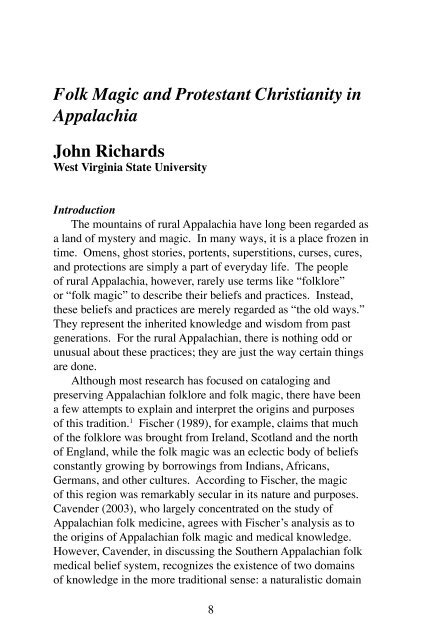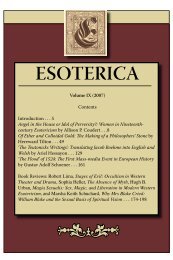Download - Esoterica - Michigan State University
Download - Esoterica - Michigan State University
Download - Esoterica - Michigan State University
You also want an ePaper? Increase the reach of your titles
YUMPU automatically turns print PDFs into web optimized ePapers that Google loves.
Folk Magic and Protestant Christianity in<br />
Appalachia<br />
John Richards<br />
West Virginia <strong>State</strong> <strong>University</strong><br />
Introduction<br />
The mountains of rural Appalachia have long been regarded as<br />
a land of mystery and magic. In many ways, it is a place frozen in<br />
time. Omens, ghost stories, portents, superstitions, curses, cures,<br />
and protections are simply a part of everyday life. The people<br />
of rural Appalachia, however, rarely use terms like “folklore”<br />
or “folk magic” to describe their beliefs and practices. Instead,<br />
these beliefs and practices are merely regarded as “the old ways.”<br />
They represent the inherited knowledge and wisdom from past<br />
generations. For the rural Appalachian, there is nothing odd or<br />
unusual about these practices; they are just the way certain things<br />
are done.<br />
Although most research has focused on cataloging and<br />
preserving Appalachian folklore and folk magic, there have been<br />
a few attempts to explain and interpret the origins and purposes<br />
of this tradition. 1 Fischer (1989), for example, claims that much<br />
of the folklore was brought from Ireland, Scotland and the north<br />
of England, while the folk magic was an eclectic body of beliefs<br />
constantly growing by borrowings from Indians, Africans,<br />
Germans, and other cultures. According to Fischer, the magic<br />
of this region was remarkably secular in its nature and purposes.<br />
Cavender (2003), who largely concentrated on the study of<br />
Appalachian folk medicine, agrees with Fischer’s analysis as to<br />
the origins of Appalachian folk magic and medical knowledge.<br />
However, Cavender, in discussing the Southern Appalachian folk<br />
medical belief system, recognizes the existence of two domains<br />
of knowledge in the more traditional sense: a naturalistic domain<br />
8



